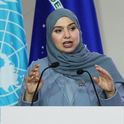There are many, often contradictory, dimensions to any foreign policy, but it is in the realm of peace and security that the ethical identity of governments is forged. Labour has come to power with the world in a more volatile and violent state than at any time since the Second World War. In addition, Keir Starmer inherits a hollowed out Foreign Commonwealth and Development Office (FCDO) in dire need of attention.
The consequences of climate change—vast and rapid population movements; resource scarcity—are driving massive upheaval. A 2013 study estimated that a two-degree Celsius rise in global temperatures could lead to a 50 per cent increase in conflict in some regions. As temperatures and levels of violence both continue to rise, those predictions are coming true. We are also in what the former foreign secretary David Miliband calls an age of impunity, where “lack of accountability for crimes in places like Syria and Yemen” has emboldened violations of international law in Ukraine, Sudan and elsewhere. Without considerable change to how we confront these global threats, systematic violence—including genocide, crimes against humanity and armed conflict—will become increasingly frequent as we approach the mid-21st century. This is the world that Labour’s foreign policy must contend with.
Nobody yet knows how the foreign secretary David Lammy’s approach of progressive realism, a stratagem he first outlined in April in Foreign Affairs, will translate. There is a scepticism in the Foreign Office and among policy wonks of more slogans—“Global Britain” became a global joke that still lingers. Lammy says progressive realism “is the pursuit of ideals without the delusions about what is achievable”. He promises a foreign policy “in the service of just goals—for example climate change, defending democracy, and advancing the world’s economic development”, but he is clear that there is a ceiling to these ambitions.
Lammy’s progressive realism feels more like a set of guardrails than a vision. After years of, at times, outrageous violations of progressive, internationalist principles and law, this is not at all unwelcome. Labour’s manifesto promised that Britain would “be a reliable partner, a dependable ally and a good neighbour… a good partner for international development and a defender of the international rule of law”. This might seem unsatisfying to those seeking big foreign policy or development pledges from the new government, but what Labour has set out does acknowledge core principles. And this approach could go far at a time when a new principled internationalism is desperately needed across much of the Global North.
Scrapping the Rwanda plan, restoring financial support to UNRWA (the UN’s agency for Palestinian refugees) and dropping political objections to the application for Benjamin Netanyahu’s International Criminal Court arrest warrant are steps in the right direction, but also the very least that we should expect from a progressive foreign policy.
If Lammy is to implement what’s been promised, he must put human rights at the centre, not let them become a side issue. This should make good sense to the realists as well as the progressives. After all, no strategy towards Russia or China can truly succeed in the long term without addressing Vladimir Putin’s or the Chinese Communist Party’s deliberate violations of rights and of international law. Likewise, any policy on the changing climate, evolving technology and AI or democracy must reckon with rights, power and violence. “Wars don’t start because people are poor,” as former UN human rights high commissioner Zeid Ra’ad Al Hussein told the Foreign Affairs Committee in 2020, “They start because of structural discrimination and the deliberate attempt to marginalise people.”
The foreign secretary has promised to reverse the last government’s efforts to undermine parts of the international system. He will need to go further. From Afghanistan to Ukraine to Sudan to Gaza, the last government made catastrophic decisions where human rights were deprioritised or ignored. Many of Britain’s biggest recent international policy mistakes come from failing to recognise or prepare for the risks that mounting rights deficits posed to the safety of whole populations, as well as regional, and at times global, security.
Starting to undo this and establishing a progressive foreign policy requires (at least) two things. Both are cheap, although neither is necessarily that easy.
First, and inevitably, the FCDO needs clear, consistent and creative political leadership from Number 10 and the foreign secretary, supported by ambassadors and top civil servants. Lammy is the ninth foreign secretary in 10 years. Amid this churn, in 2020, then prime minister Boris Johnson instructed the merger of the Foreign Office with the Department for International Development (DfID), against the advice of the development sector and pre-empting the findings of Johnson’s own Integrated Review of Defence, Diplomacy and Development. The decision came as such a shock that some senior DfID directors only found out as Johnson made the announcement in the House of Commons. It caused years of chaos as officials scrambled to implement the unplanned restructure.
Civil servants have lost confidence in the department as a result. New leaders are required, even if parts of the FCDO are deeply resistant to change. The British diplomatic corps must be revived but also reimagined. There is considerable talent within its ranks, but outdated approaches to hiring and promotion constrain difference and creativity. The FCDO is probably one of the least diverse government departments. This is too often reflected in how decisions are made and who is listened to. It impacts, too, how rights and power are understood in the department. Now, however, we have a foreign secretary descended from a lineage that includes people who were enslaved. It did not go unnoticed by FCDO officials that Lammy delivered his welcome speech to staff against the backdrop of the racist colonial artworks that are found across the Foreign Office building on King Charles Street. Whether or not this was Lammy’s intention, expectations of what the FCDO can become will now be raised for those who sought or fought for internal reform under the Tories.
Second—and technical as it sounds—rights-based political strategy needs to become the responsibility of several jobholders across the FCDO and Number 10. This would complement or, where necessary, pose a constructive challenge to those parts of government tasked with pursuing national security, UK trade interests, climate policy, tech and AI, crisis preparedness and so on. Whether it is a result of the merger, inconsistent leadership or the shapeshifting organogram of the FCDO, this particular expertise is hard to find.
Some officials will disagree, but ministers, ambassadors and directors have repeatedly told me over the years that they are not receiving the rights-based analysis they need to take difficult decisions on situations of violent crisis. Multiple inquiries by the Foreign Affairs and the International Development committees, including on Xinjiang, Myanmar, Sudan, Gaza and Afghanistan, back this up. Time and again responsibilities for human rights, the prevention of genocide, crimes against humanity and conflict are delegated to junior FCDO staff, whether in London or in the affected country, whose analysis and warnings rarely reach ministers. Nor is it anyone’s primary job in Number 10 to advise the prime minister on human rights and international strategy. As a result, such critical considerations get lost and the expertise itself is maligned.
The cheapest and most effective thing the new government can do to strengthen—and rationalise—UK foreign policy is to address these creaking FCDO systems and knowledge gaps. To do more with less, Lammy is going to need a strong team. Almost certainly, he will need a greater number of ministers than he has so far appointed. They will need to be supported by geographic and thematic envoys who have heft, and advisers who have the seniority to move across government. In times of crisis, it is diplomats at every level picking up the phones and stalking the corridors who move the political compass. This is the skillset that can ease diplomatic gridlock, buy time and avoid disaster. It can save lives, but also money.
The role of special adviser is contested. Officials hate SpAds, ministers need them, and so many of the staff in political parties want to be one of them. However, done well, the SpAd is among the few roles in Whitehall that enables people to move with relative freedom and creativity. They should be responsible not only for protecting the interests of their ministers but for synthesising party policy and bureaucratic reality. John Bew, the former chief foreign policy adviser in Number 10, was one of the rare points of consistency in UK foreign policy. He survived multiple prime ministers, perhaps because he wasn’t a party adviser but an expert. Creating thematic advisers, appointed for their technical and strategic expertise, will ease the bottlenecks that currently afflict the FCDO.
There are other ways that expertise can be brought in, too. Just as Keir Starmer has promised to establish expert mission boards to support domestic policy areas, the same is needed to inform and test the progressive realist credentials of Labour’s emergent foreign policy. Like other departments, the FCDO needs to open itself back up to civil society and rebuild trust that has been lost over the past decade. Most important of all, and a major indicator of how progressive Lammy’s FCDO becomes, will be how the expertise of those nearest to violence and inequity is heard, respected and incorporated into decision-making.
Whatever Labour’s foreign policy evolves into it needs to start with the basics, but ministers and advisers must not assume that this argument will easily be won. A foreign policy that considers first international law, the community of nations of which we are a part and the rules that seek to secure collective safety will require quite radical change—at least by the traditional standards of our foreign office. And now there is an opportunity. The Treasury is understandably preoccupied with balancing domestic costs, and what the FCDO needs right now isn’t big money but smart people, smart systems and revived strategy.
The recent general election was never going to be fought on foreign policy. The devastation of Gaza, the consequences of Brexit and our rapidly heating planet, were, however, always in the background. In fact, for many voters those issues came first. Foreign policy is becoming increasingly important to the voting public. Polling from 2019 found that people in the UK under 35 are far more likely to feel more European and part of a global community than older generations, while also retaining a sense of national identity.
Number 10 and Labour's campaign director Morgan McSweeney—already and rightly working on winning the next election—would do well to recognise that these shifts in foreign policy, delivered well, will quietly yet solidly rebuild the UK’s international standing, but also confidence at home. We are a country in decline and voters of varying stripes will respond to a restoration of pride.
This isn’t the time for paper flags and penny slogans. The necessary reimagining and transformation of Britain cannot be secured without a new approach to foreign policy. This should be prioritised alongside urgent domestic matters. Delivered seriously, a new kind of positive, progressive patriotism could well help Labour secure its next election victory.












